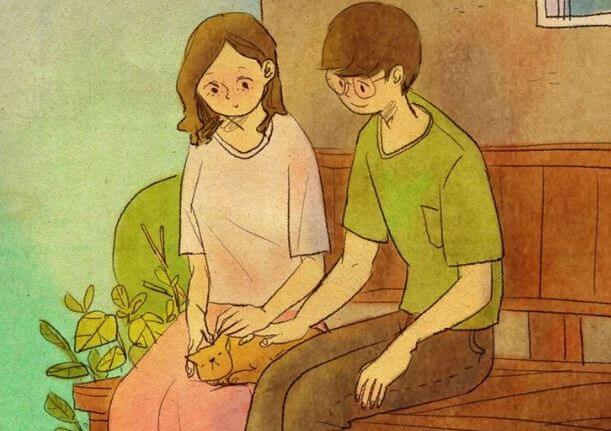Treating Someone with Affection Is Touching Their Soul with Respect

Treating someone with affection is the best way to show respect. It is synonymous with goodness, kindness, and love. Why wouldn’t we treat the people we love with affection?
It seems obvious, but in fact, we easily forget the importance of treating people delicately. Bad answers, disrespect, back talk, screams, demands…surely each of these reactions is too present in our relationships and in how we interact.

How to connect emotionally
A word, a question, a gesture, a glance, a touch. Any expression is an attempt to connect emotionally with someone. With these we say “I want to feel connected to you.” Based on how the other receives our gesture, we will get a positive or negative response to our request.
If we stop to think about it, it is overwhelming how often we ignore or react negatively to these connection attempts. Hence the importance of learning to touching with affection, to touch others with respect.
Our attempts to connect would be much more fruitful if we knew how to recognize the emotional necessities of others. Many fights are the result of misunderstandings and a sense of disconnection that can be avoided with a conversation.
By not talking with respect to others, our relationships wither and deteriorate. When we ignore the importance of connecting, we usually propel our own isolation, our dissatisfaction and our instability.

The answers to emotional connection attempts
Complete and satisfying relationships are not achieved overnight. They develop gradually with multiple gestures that build stability and love in our patterns of interaction.
Every day and with every small gesture we are laying bricks in our castle and, of course, these exchanges are the pillars of emotional information that nourish our affection.
Positive responses lead to continuous and healthy interactions. They consist of the master stroke in a ping pong match in which both participants play with pleasure. However, negative responses cancel any attempt to make a connection. That is, if you throw the ball and the other person doesn’t move their paddle the game is over.

In short, we have several options for responding to those attempts to make a connection and, according to them, we will be playing ping pong for a while. Let’s see what ways we can respond to a gesture by others:
- Respond with empathy to the other person. For example, when a person makes a funny comment and the other person laughs. If we promote these kinds of connections, we will be rewarded with lasting relationships and be full of good feelings.
- Reply with hostility. People who respond with hostility may be called belligerent or argumentative. Using these types of replies expresses sarcasm and contempt. One example would be: “I would like to buy a car” and the hostile response: “Only in your dreams with your salary.”
- Ignoring the other person. This is synonymous to ignoring the attitude of the other person, which obviously destroys our relationships.

Treating the people we appreciate with affection should’t be an exception, but a rule. We often neglect these details and weaken our relationship, which will inevitably deteriorate.
So let’s get our act together and be careful of the answers we give in our day to day lives. We cannot allow the bad gestures to be fueled and let’s address the attempts for emotional connection as we should, with respect and tolerance.
NOTE: If the reader wants to know more about this topic they can read authors such as John Gottman or Deborah Tannen.
Images courtesy of Puung and Claudia Tremblay
The Greatness of People Is In The Small Details
The greatness of people is not measured by money or their beauty. It is measured by small details such as loyalty… See more »
This text is provided for informational purposes only and does not replace consultation with a professional. If in doubt, consult your specialist.








